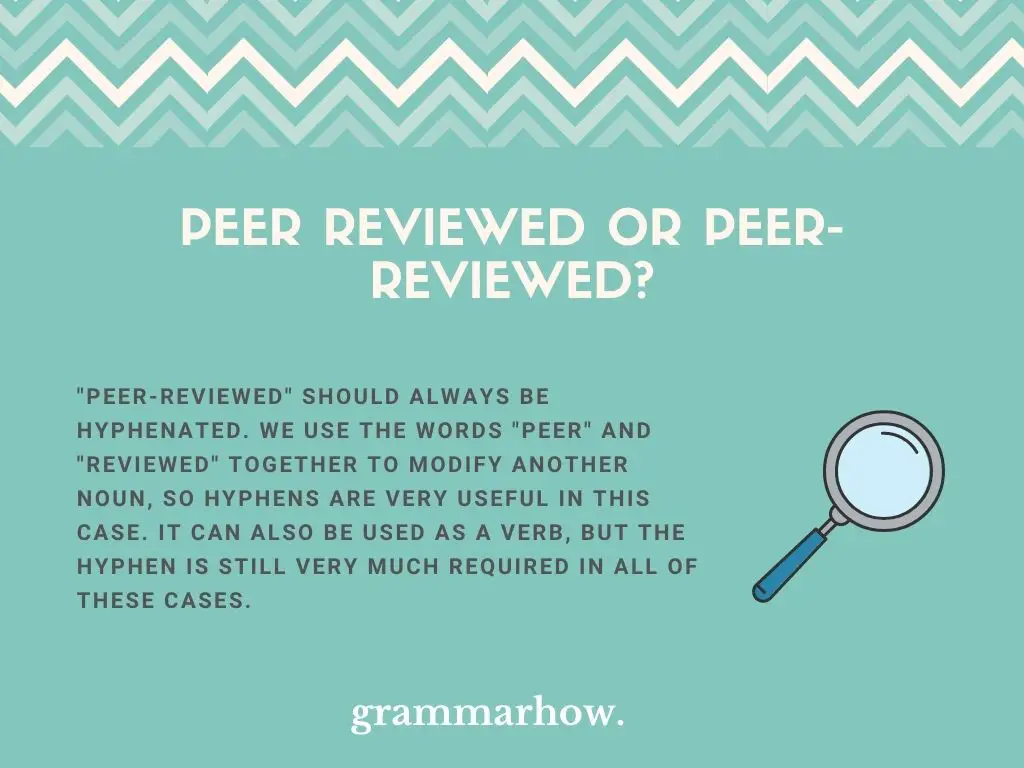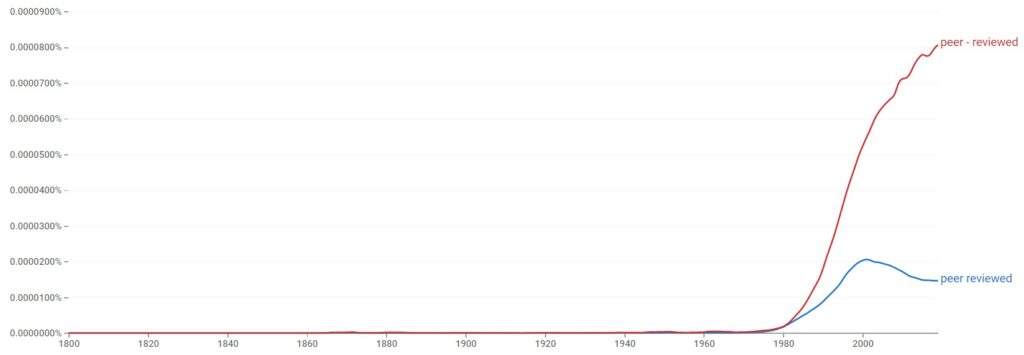It would help to know how to write “peer-reviewed” when it counts. This article will look into whether it’s a hyphenated form or not. Some people write it as one or two words, which might be confusing if you don’t know all the nuances about hyphenation rules.
Peer reviewed vs. Peer-reviewed
“Peer-reviewed” should always be hyphenated. We use the words “peer” and “reviewed” together to modify another noun, so hyphens are very useful in this case. It can also be used as a verb, but the hyphen is still very much required in all of these cases.

According to Google Ngram Viewer, “peer-reviewed” is the best choice of the two. This vast difference in popularity shows that “peer-reviewed” should always be hyphenated. While “peer reviewed” sees some usage, it’s not grammatically correct.

It would help to refer to The Cambridge Dictionary and The Oxford Dictionary to learn more about the forms. Both dictionaries list “peer-reviewed” as the correct form, and they mention that “peer-reviewed” is correct as both an adjective and a noun.
The Oxford Dictionary also has an entry for “peer review,” which is correct without a hyphen when in the noun form. However, since it’s a noun form, there is no way we can add the “-ed” ending to it (since we cannot change the tense of nouns).
Therefore, “peer reviewed” is not grammatically correct as it would only apply if we are talking about a noun. Nouns cannot be in the past tense in this way.
Peer reviewed
“Peer reviewed” does not work. We cannot write it as two separate words because “peer” and “reviewed” are always working together to modify another item in a sentence. Hyphen rules are important to include whenever something like this happens.
The only time that hyphens wouldn’t be required is when “peer reviewed” is a noun. However, it is not possible to include “reviewed” in the past tense when we are working with the noun form. That’s why we cannot use the unhyphenated variation.
Check out some of these examples to help you understand it:
- Correct: I’m not going to be able to get this peer-reviewed in time for you, I’m afraid.
- Incorrect: Peer reviewed work is very important to us on this campus. You’ve got to make sure you have it in place.
- Correct: If I wanted this peer-reviewed, I would have asked you about it much sooner! Oh, well!
- Incorrect: I’m not going to get this peer reviewed for another few weeks. Do you think that’s going to be okay?
Peer-reviewed
“Peer-reviewed” is always correct when hyphenated. We must group “peer” and “reviewed” when they both work to modify the same noun in a sentence. Also, when written as a verb (meaning an action), we must use them in their hyphenated form to show they happen together.
We can refer to the AP Stylebook to learn about hyphens when it comes to adjective forms. If more than one word is needed to modify the same noun, then a hyphen is required to demonstrate how this modification takes place.
Since “peer” and “reviewed” are always used to modify a noun in the adjective form (i.e. “peer-reviewed journal”), we must keep them true to the AP Style rules to make sure we’re writing in a grammatically correct way.
Some of these examples should help you make sense of what we mean:
- If you’re looking for that to get peer-reviewed, you should find somebody who has a little more knowledge than I do.
- I’m not reading any peer-reviewed journals from him because I don’t trust any of his “peers.”
- Peer-reviewed findings are going to be the most beneficial for us if we want to get decent results from what’s going on.
- I find it hard to get things peer-reviewed. It’s like nobody agrees with my scientific prowess!
Is “Reviewed” Capitalized In The Word “Peer-Reviewed”?
Finally, it would help to look over how capitalization works when hyphenating. This can stump even a native speaker, so if you can figure this out early, you’re in for a good time!
Capitalization works similarly with hyphenated words as it does with normal words. Since “peer-reviewed” is not a proper noun, you do not have to worry about it.
However, if writing it in a title, you might find it useful to capitalize both parts rather than just “peer.” This is because it will help it stay more in line with every other word in your title (if your style means you capitalize all your words).

Martin holds a Master’s degree in Finance and International Business. He has six years of experience in professional communication with clients, executives, and colleagues. Furthermore, he has teaching experience from Aarhus University. Martin has been featured as an expert in communication and teaching on Forbes and Shopify. Read more about Martin here.
